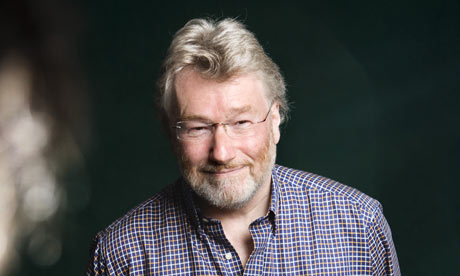 Iain (M.) Banks is now where he rightfully belongs — hurtling through space. Though, we fear that he may well not be traveling as fast as he would have wished.
Iain (M.) Banks is now where he rightfully belongs — hurtling through space. Though, we fear that he may well not be traveling as fast as he would have wished.
From the Minor Planet Center:
In early April of this year we learnt from Iain Banks himself that he was sick, very sick. Cancer that started in the gall bladder spread quickly and precluded any cure, though he still hoped to be around for a while and see his upcoming novel, The Quarry, hit store shelves in late June. He never did—Iain Banks died on June 9th.
I was introduced to Iain M. Banks’s Sci-Fi novels in graduate school by a good friend who also enjoyed Sci-Fi; he couldn’t believe I’d never even heard of him and remedied what he saw as a huge lapse in my Sci-Fi culture by lending me a couple of his novels. After that I read a few more novels of my own volition because Mr Banks truly was a gifted story teller.
When I heard of his sickness I immediately asked myself what I could do for Mr Banks, and the answer was obvious: Give him an asteroid!
The Minor Planet Center only has the authority to designate new asteroid discoveries (e.g., ’1971 TD1?) and assign numbers to those whose orbits are of a high enough accuracy (e.g., ’5099?), but names for numbered asteroids must be submitted to, and approved by, the Committee for Small Body Nomenclature (CSBN) of the IAU (International Astronomical Union). With the help of Dr Gareth Williams, the MPC’s representative on the CSBN, we submitted a request to name an asteroid after Iain Banks with the hope that it would be approved soon enough for Mr Banks to enjoy it. Sadly, that has not been possible. Nevertheless, I am here to announce that on June 23rd, 2013, asteroid (5099) was officially named Iainbanks by the IAU, and will be referred to as such for as long as Earth Culture may endure.
The official citation for the asteroid reads:
Iain M. Banks (1954-2013) was a Scottish writer best known for the Culture series of science ?ction novels; he also wrote ?ction as Iain Banks. An evangelical atheist and lover of whisky, he scorned social media and enjoyed writing music. He was an extra in Monty Python & The Holy Grail.
Asteroid Iainbanks resides in the Main Asteroid Belt of the Sol system; with a size of 6.1 km (3.8 miles), it takes 3.94 years to complete a revolution around the Sun. It is most likely of a stony composition. Here is an interactive 3D orbit diagram.
The Culture is an advanced society in whose midst most of Mr Banks’s Sci-Fi novels take place. Thanks to their technology they are able to hollow out asteroids and use them as ships capable of faster-than-light travel while providing a living habitat with centrifugally-generated gravity for their thousands of denizens. I’d like to think Mr Banks would have been amused to have his own rock.
Read the entire article here.
Image: Orbit Diagram of asteroid (5099) Iainbanks. Cyan ellipses represent the orbits of the planets (from closer to further from the Sun) Mercury, Venus, Earth, Mars and Jupiter. The black ellipse represents the orbit of asteroid Iainbanks. The shaded region lies below the ecliptic plane, the non shaded, above. Courtesy of Minor Planet Center.

 On June 9, 2013 we lost Iain Banks to cancer. He was a passionate human(ist) and a literary great.
On June 9, 2013 we lost Iain Banks to cancer. He was a passionate human(ist) and a literary great. Where is the technology of the Culture when it’s most needed? Nothing more to add.
Where is the technology of the Culture when it’s most needed? Nothing more to add.